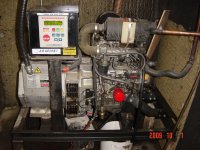If you use genset all Winter, go ahead and add suitable heat-exchanger to you heating loop and shunt the coolant into it just to see what's up. Electric load/output will likely vary more than heat output and fuel use/hr. (frictional losses, other real inefficiencies)
I suggest that the general idea is more sensible than silly. What to do with excess Kw, or on the coldest days? Run electric heaters at the cost you'd get the grid to pay you to feed back. When you don't need the heat, grid power saves gen fuel/oil, allows service.
Cold days, run the genset and coast thru the night (heat, as said) on-grid for clocks, office UPS, etc. KISS by switching elec source by human decision when firing up the gen, say vs ever expecting automatic stuff to know when you'd like to bump the thermostat on a dreary day or whatever.
I say don't overthink the complexity. Three separate but SxS controls, I imagine. 1) Switch power from grid to gen. (have it anyway?) 2) Switch/valve to shunt 'spit' loop 3) Switch to start gen. Build separately, and instruct to
operate separately-but-in-unison. Your youngest could switch 'em with a holler from the other room. (If it looks like a good long-term plan, add sophistication/automation as time and budget allow tech tweaks.) btw, such a project/prototype sounds easy for a guy like BT.




